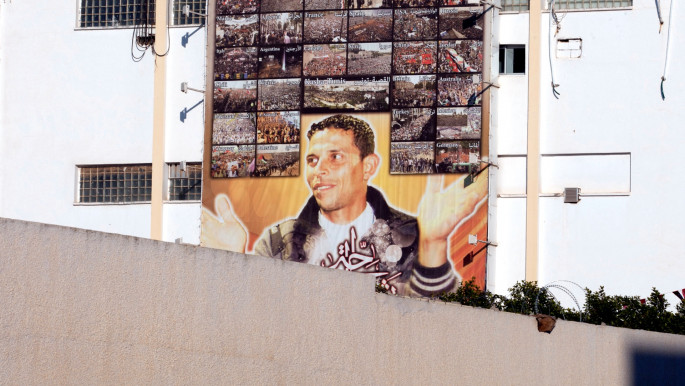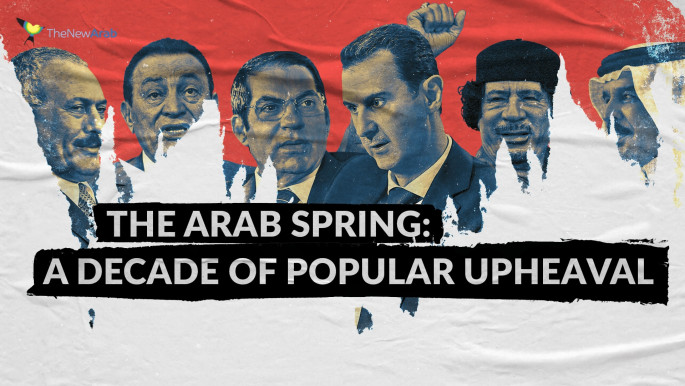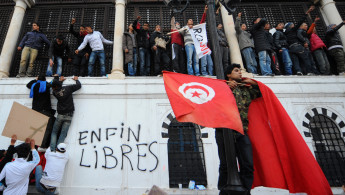Tunisia's rocky path to democracy: Fighting to advance the hard-won freedoms of the revolution
Ten years into the Arab Spring, Tunisia is moving along a rocky path to democracy after advancing landmark social reforms since the 2011 revolution that toppled Zine El Abidine Ben Ali.
A new progressive constitution adopted in 2014 guaranteed unprecedented human rights and individual freedoms for all groups, including laws to improve the status of women. But progress is still needed to fix the deep-rooted practices, customs and legislation that form barriers to upholding the rights of all Tunisians.
Women's rights
In the years following the Tunisian revolution, women saw many of their rights enshrined in legislation, partly thanks to the tireless work of the dozens of independent women's organisations that were newly created throughout the country.
The 2014 Constitution that emerged from the 2011 uprising was driven by a new rationale aiming to safeguard protection for women's rights and recognise gender equality. The legal text successfully included the principle of equality between men and women, countering some resistance on women's rights from religious conservatives.
 |
Ten years into the Arab Spring, Tunisia is moving along a rocky path to democracy after advancing landmark social reforms following the 2011 revolution |  |
But ten years on, a lot of the charter's provisions formulated to protect women exist in name only. The constitution, though liberal in spirit, is anchored in the context of outdated laws, entrenched practices and conservative social norms used by state institutions.
Tunisia's 1956 Code of Personal Status (CPS), which gave some considerable rights to women in divorce and abortion and outlawed polygamy, is often acclaimed as the Arab world's most progressive piece of women's rights legislation. Nonetheless, from its inception to the present day the code has existed within a religious-patriarchal framework that favours gender discrimination and prevents women from enjoying all of their rights.
Such a paradigm is inconsistent with the values of the Tunisian revolution and the advancements in society made over the last decade as the country has moved through its socio-demographic and democratic transition. Legal provisions and practices still discriminate against women, particularly on matters of inheritance.
 |
|
| Read more: Tunisia: The road to revolution |
The contentious issue of equality in inheritance was raised in 2018 after the Commission for Individual Freedoms and Equality (COLIBE), created by former president Beji Caid Essebsi the year before, which put forward recommendations for social reforms, including a bill on gender equality in inheritance.
Rights activists and women have since amplified calls for authorities to open discussions on the draft law in the hope of speeding up its approval, receiving a strong pushback from conservatives, especially Islamists.
With a parliamentary majority made up of conservative forces, notably Ennahda and the Dignity Coalition, lobbying against the COLIBE's initiative and persuading secular parties such as Qalb Tounes, the draft is expected to be blocked from going ahead if presented for a vote.
"The overall goal of bringing into being laws that guarantee either equal rights for men and women or personal liberties hasn't been fulfilled till now," Rahma Essid, secretary-general of Association of Free Thinkers (ALP), told The New Arab.
In the same year the commission was established women's rights saw an important development. A landmark law on violence against women (Law 58) was adopted in July 2017 abolishing Article 227 (a) of the Tunisian criminal code that allowed rapists to bypass punishment if they married their victims.
The law broadened the definition of gender-based violence and introduced measures to prevent and prosecute all forms of violence including sexual harassment and marital rape. Much of the legislation has yet to be enforced. That includes availability of adequate shelter as well as legal, medical and mental health support for survivors of violence.
 |
The overall goal of bringing into being laws that guarantee either equal rights for men and women or personal liberties hasn't been fulfilled |  |
Despite the comprehensive legal protections, cases of gender violence have continued to rise. The phenomenon was already alarming before the Covid-19 pandemic, with nearly half of Tunisian women falling victim to violence in their lifetime and one in three enduring domestic violence.
Throughout the national lockdown, the Tunisian emergency number managed by the women's ministry recorded a five-fold increase in calls to report domestic violence compared to the same period last year. Between March and May, government hotlines received over 7,000 complaints, 1,425 of which occurred during the first month of the lockdown.
Feminists strongly criticised the government for not taking the matter seriously during the pandemic, whether that be refusing to acknowledge domestic violence complaints, or curtailing women's access to justice through the decision to halt all court proceedings for the duration of the lockdown.
Since the start of the year, almost 14,000 complaints of violence against women were recorded, the ministry of women announced on the day of the launch of the 16 Days of Activism against Gender-Based Violence campaign (25 November – 10 December).
To mark International Day for the Elimination of Violence against Women, on 25 November, a coalition of women's organisations and civil society groups, including the Tunisian Association of Democratic Women (ATFD), Beity Association and the Tunisian League for the Defense of Human Rights (LTDH), issued a statement calling upon public authorities to act urgently in the face of rising gender violence.
"We demand equality and express our solidarity. We have had enough of counting victims," the statement read. "The ones who are killed by discrimination, violence, economic exploitation and social stigmatisation are more than those killed by terrorism and COVID-19 pandemic".
 |
|
| Read more: Mohamed Bouazizi, 1984-2011: The fire that lit the Arab Spring |
Hard-won freedom of expression at risk
Freedom of speech is viewed as one of the most solid achievements of the Jasmine Revolution. The North African state, a rare beacon of democracy in the Arab world, has made laudable progress in terms of freedom of expression, press and media since the overthrow of the Ben Ali regime.
Several private television and radio stations were started, social media has multiplied, and Tunisians have been free to use online tools to post their opinions and organise social movements of any kind. Last September, the first independent press council in the MENA region was established in Tunisia, a milestone in the country's reform process since the revolution, which is supposed to play a key role in protecting press freedom and the right to freedom of expression.
But authorities have resorted to vague criminal laws to punish and prosecute online commentary, targeting bloggers, administrators of widely followed Facebook pages, political activists and human rights defenders.
Amnesty International revealed that since 2018, at least 40 people have faced criminal prosecution for publishing online posts critical of local authorities, the police or other state officials. In a briefing issued in November, the UK-based rights group urged Tunisian authorities to stop using "largely outdated, overly broad and repressive laws" to crack down on freedom of expression online.
"It is extremely disturbing to see bloggers and activists being targeted with criminal prosecutions under laws that date back to the time of repression in Tunisia ten years after the revolution," Amna Guellali, Amnesty International's deputy regional director for the Middle East and North Africa, said in a statement.
 |
There's a discrepancy between what's in the constitution and what happens in reality. We're still seeing rights violations and gaps in legal protections of rights |  |
"These prosecutions threaten the human rights progress made so far in Tunisia where the right to freedom of expression is a hard-won value of the revolution", she added. Two reports by Human Rights Watch, published in January and October 2019, documented the prosecution of bloggers and social media activists in Tunisia for online criticism.
Essid underlined that free speech is not fully enjoyed, citing the persecution of individuals over Facebook posts. "There's a discrepancy between what's in the constitution and what happens in reality. We're still seeing rights violations and gaps in legal protections of rights," ALP's coordinator said.
Just last month, Wajdi Mahouechi, a blogger, was sentenced to two years in prison for posting a Facebook video that denounced a Tunis public prosecutor's failure to arrest and investigate an imam who appeared to justify killing people who insult the Prophet Muhammad.
Earlier in July, 27-year-old blogger Emna Chargui was sentenced to six months in prison on charges relating to a satirical social media post imitating Quran verses which was deemed "offensive to Islam", despite the fact that freedom of conscience and belief is constitutionally guaranteed.
 |
|
| Read more: Is the Arab Spring still relevant a decade later? |
Press freedom is also at risk. A bill recently proposed by the Islamist Dignity Coalition in May is intended to amend the 2011 Decree on the Freedom of Audio-Visual Communication law.
The amendment, if adopted, would alter the appointment to and renew the composition of the High Independent Authority of Audio-Visual Communication (HAICA), established in 2013, besides removing its power to issue licences for the creation of TV channels.
In October, rights groups in Tunisia called on parliament not to pass the bill which they said would "undermine" HAICA's independence, enabling certain financial lobbies and political forces to "control" the regulatory authority, thus threatening media pluralism in the country.
In the same month, the draft organic law on the freedom of audio-visual communication, which the previous government had submitted to parliament in July, was withdrawn by PM Hichem Mechichi.
"These signs well indicate that some financial and political actors want to dominate the media space," SNJT member Rim Saoudi told The New Arab, stressing that following last year's elections there have been clear attempts at altering the media landscape. She remarked that media workers have "resisted" all types of "backward pressures" since the 2011 revolution.
In addition, the current government has still not complied with publication of the journalists' framework convention in the Official Gazette. After holding a series of protests in late November, the Tunisian press syndicate (SNJT) decided to observe a strike in the media sector on 10 December "over the government's continued procrastination policy in issues related to professional and economic rights of journalists".
 |
While Tunisia is widely considered the Arab Spring's only success story because of its democratic transition and progress in individual rights, significant work remains to safeguard those freedoms |  |
LGBT rights no longer taboo
With the departure of Ben Ali, thousands of civil society organisations sprang up in the post-revolutionary years, and sexual minorities who were unseen and unheard under the dictatorship found a window of opportunity to speak out.
Tunisian groups representing LGBT people like Shams, Mawjoudin and Damj appeared for the first time in the country and brought the subject into the public discussion. "The gay community has gained visibility, real public debate has been opened up," Badr Baabou, president and co-founder of LGBT rights group Damj, told The New Arab. "It's no longer a taboo subject in Tunisian society".
A decade later, gay rights groups have carved up a lively space for themselves to discuss, raise awareness and campaign for the community's cause in Tunisia. There are now five licensed associations advocating for LGBTQ+ rights. These associations hold public protests, lobby politicians, partner with other NGOs, lawyers, the media and international organisations. There is an annual queer film festival, the first of its kind in the Arab region, which is organised by Mawjoudin.
With increased awareness in society and state institutions, Baabou said there has been some improvement in dealing with the police and accessing justice. The state as a whole, he explained, has shown a more open attitude in discussing LGBT issues across the different relevant ministries.
Still, there is a long way to go for the LGBTQ+ community in a country where non-heterosexuals are also publicly criticised and stigmatised.
Although not explicitly illegal in Tunisia, homosexuality is a crime punishable by up to three years imprisonment. LGBT individuals still risk persecution or arrest because of their sexuality or gender identity, which contradicts principles of individual freedom and physical integrity enshrined in the constitution.
The government-appointed Individual Freedoms and Equality Committee (COLIBE), among its recommendations issued in 2018, called for the abolishment of Article 230 of the Tunisian penal code criminalising same-sex relations, and urged a ban on forced anal examinations which are often used for suspected homosexuals.
Inspired by the committee's report, a group of Tunisian MPs put forth a draft law to create a Code of Individual Rights and Liberties. However, there has been no follow-up to date, raising the risk of seeing the draft code buried under the reluctance of the conservative camp and many of the deputies of the new parliament elected in October 2019, who are hostile to individual freedoms.
"We are not seeing political will to move forward and revive efforts for the code's adoption. Economic and social issues are considered the main priority, especially during the COVID-19 crisis," Damj's president noted, "but we will reopen the debate once the situation returns to normal".
While Tunisia is widely considered the Arab Spring's only success story because of its democratic transition, as well as its progress in terms of public and private liberties and women's rights, significant work remains to safeguard those freedoms. The young Arab democracy is working hard to resist regressive pushbacks and preserve and enhance its revolutionary wins.
Alessandra Bajec is a freelance journalist currently based in Tunis.
Follow her on Twitter: @AlessandraBajec



